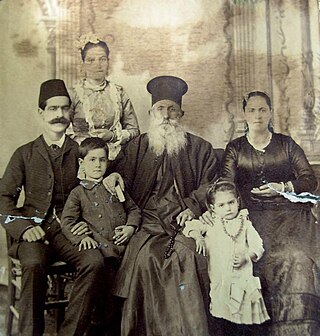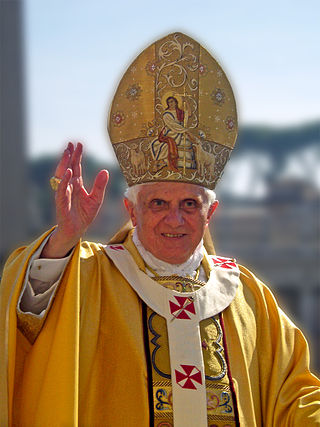Related Research Articles
In the canon law of the Catholic Church, the loss of clerical state is the removal of a bishop, priest, or deacon from the status of being a member of the clergy.
Clerical celibacy is the requirement in certain religions that some or all members of the clergy be unmarried. Clerical celibacy also requires abstention from deliberately indulging in sexual thoughts and behavior outside of marriage, because these impulses are regarded as sinful. Vows of celibacy are generally required for monks and nuns in Christianity, Buddhism, Hinduism, Jainism and other religions, but often not for other clergy.

Clerical marriage is the practice of allowing Christian clergy to marry. This practice is distinct from allowing married persons to become clergy. Clerical marriage is admitted among Protestants, including both Anglicans and Lutherans. Some Protestant clergy and their children have played an essential role in literature, philosophy, science, and education in Early Modern Europe.

Emmanuel Milingo is an excommunicated former Roman Catholic archbishop from Zambia. He was ordained in 1958; in 1969, aged 39, Milingo was consecrated by Pope Paul VI as the bishop of the Archdiocese of Lusaka. In 1983, he stepped down from his position as Archbishop of Lusaka after criticism for exorcism and faith healing practices that were not approved by church authorities. In 2001, when Milingo was 71, he received a marriage blessing from Sun Myung Moon, the leader of the Unification Church, despite the prohibition on marriage for ordained priests. In July 2006, he established Married Priests Now!, an advocacy organization to promote the acceptance of married priests in the Roman Catholic Church.
The canon law of the Roman Catholic Church requires that clerics "observe perfect and perpetual continence for the sake of the kingdom of heaven". For this reason, priests in Roman Catholic dioceses make vows of celibacy at their ordination, thereby agreeing to remain unmarried and abstinent throughout their lives. The 1961 document entitled Careful Selection and Training of Candidates for the States of Perfection and Sacred Orders stated that homosexual men should not be ordained. In 2005, the Church clarified that men with "deeply rooted homosexual tendencies" cannot be ordained. The Vatican followed up in 2008 with a directive to implement psychological screening for candidates for the priesthood. Conditions listed for exclusion from the priesthood include "uncertain sexual identity" and "deep-seated homosexual tendencies".
The Pastoral Provision is a set of practices and norms in the Catholic Church in the United States, by which bishops are authorized to provide spiritual care for Catholics converting from the Anglican tradition, by establishing parishes for them and ordaining priests from among them. The provision provides a way for individuals to become priests in territorial dioceses, even after Pope Benedict XVI's Anglicanorum Coetibus proclamation established the Personal Ordinariates, a non-diocesan mechanism for former Anglicans to join the Church.
Sacerdotalis caelibatus is an encyclical written by Pope Paul VI. Acknowledging the traditions given by the Holy Spirit to the Church in the East and acknowledging some few pastoral exceptions in the West, the encyclical explains and defends the Catholic Church's tradition of clerical celibacy in the West. The encyclical is dated 24 June 1967.

The sacrament of holy orders in the Catholic Church includes three orders: bishops, priests, and deacons, in decreasing order of rank, collectively comprising the clergy. In the phrase "holy orders", the word "holy" means "set apart for a sacred purpose". The word "order" designates an established civil body or corporation with a hierarchy, and ordination means legal incorporation into an order. In context, therefore, a group with a hierarchical structure that is set apart for ministry in the Church.
Call to Action (CTA) is an American progressive organization that advocates a variety of changes in the Catholic Church. Call To Action's goals are to change church disciplines and teachings in such areas as mandatory celibacy for priests, the male-only priesthood, the selection process for bishops and popes, and opposition to artificial contraception.

The priesthood is the office of the ministers of religion, who have been commissioned ("ordained") with the Holy orders of the Catholic Church. Technically, bishops are a priestly order as well; however, in layman's terms priest refers only to presbyters and pastors. The church's doctrine also sometimes refers to all baptised (lay) members as the "common priesthood", which can be confused with the ministerial priesthood of the consecrated clergy.
Clerical celibacy is the discipline within the Catholic Church by which only unmarried men are ordained to the episcopate, to the priesthood in the Latin Church, and similarly to the diaconate. In other autonomous particular churches, the discipline applies only to the episcopate. According to Jason Berry of The New York Times, "The requirement of celibacy is not dogma; it is an ecclesiastical law that was adopted in the Middle Ages because Rome was worried that clerics' children would inherit church property and create dynasties."
George Augustus Stallings Jr. is the founder of the Imani Temple African-American Catholic Congregation and was long active in the Black Catholic Movement. He served as a Catholic priest from 1974 to 1989, and was based in Washington, D.C., for many years. He established the Imani Temple as an independent denomination in 1989, making a public break in 1990 with the Catholic Church on The Phil Donahue Show. The Archbishop of Washington excommunicated him that year.
Patrick Percival "Pat" Power is a retired Australian bishop of the Catholic Church.

The African-American Catholic Congregation and its Imani Temples are an Independent Catholic church founded by Archbishop George Augustus Stallings, Jr., an Afrocentrist and former Roman Catholic priest, in Washington, D.C. In 2014, the church decided to relocate to nearby Prince George's County, Maryland; their current headquarters are located in Hillcrest Heights, Maryland.

Malcolm Patrick McMahon, OP, KC*HS is an English prelate of the Roman Catholic Church. Since 2014, he has been the ninth Archbishop of Liverpool. Previously, he was Bishop of Nottingham from 2000 to 2014.
Peter Paul Brennan was an American bishop in the Independent Catholic movement. He was Bishop of New York for the Old Catholic Confederation, a bishop of the Ecumenical Catholic Diocese of the Americas, bishop of the African Orthodox Church, primate of the Order of Corporate Reunion, and president of Married Priests Now!.

Pope Benedict XVI, who led the Roman Catholic Church as Pope from 2005 to 2013, continued manouevring the Church through the dynamics of modernity, which the Church had begun engaging in with the Second Vatican Council. Because the question of religious pluralism is a key issue raised by modernity, ecumenism, the establishment of harmony and dialogue between the different Christian denominations, is a significant concern of a post Second Vatican Council Church. Pope Benedict XVI's approach has been characterised as leaning toward the conservative while still being expansive and engaged, involving the full breadth of Christendom, including the Orthodox Churches and Protestant churches, as well as freshly engaging with other Christian bodies considered by Roman Catholics to be more heterodox, such as the Church of Jesus Christ of Latter-day Saints.
The debate on the causes of clerical child abuse is a major aspect of the academic literature surrounding Catholic sex abuse cases.

In the liturgical traditions of the Catholic Church, the term ordination refers to the means by which a person is included in one of the holy orders of bishops, priests or deacons. The teaching of the Catholic Church on ordination, as expressed in the 1983 Code of Canon Law, the Catechism of the Catholic Church, and the apostolic letter Ordinatio sacerdotalis, is that only a Catholic male validly receives ordination, and "that the Church has no authority whatsoever to confer priestly ordination on women and that this judgment is to be definitively held by all the Church's faithful." In other words, the male priesthood is not considered by the church a matter of policy but an unalterable requirement of God. As with priests and bishops, the church ordains only men as deacons.
A personal ordinariate for former Anglicans, shortened as personal ordinariate or Anglican ordinariate, is an ordinariate, a canonical structure within the Catholic Church established in order to enable "groups of Anglicans" and Methodists to join the Catholic Church while preserving elements of their liturgical and spiritual patrimony.
References
- ↑ U.S. Newswire: Archbishop Milingo: "Married Priesthood Now"; Healer Missing from Italy Emerges in U.S., Proclaims End to Mandatory Celibacy Archived 2006-09-12 at the Wayback Machine , July 12, 2006
- ↑ Pope to hold summit on married priests, November 14, 2006
- ↑ BBC News: Vatican stands by celibacy ruling, November 16, 2006
- ↑ CNA: Married former priests warn against Milingo's group, December 8, 2006
- ↑ Married priests may be expelled
- ↑ "Vatican defrocks exorcist archbishop who married". Reuters . Archived from the original on 2022-09-28.